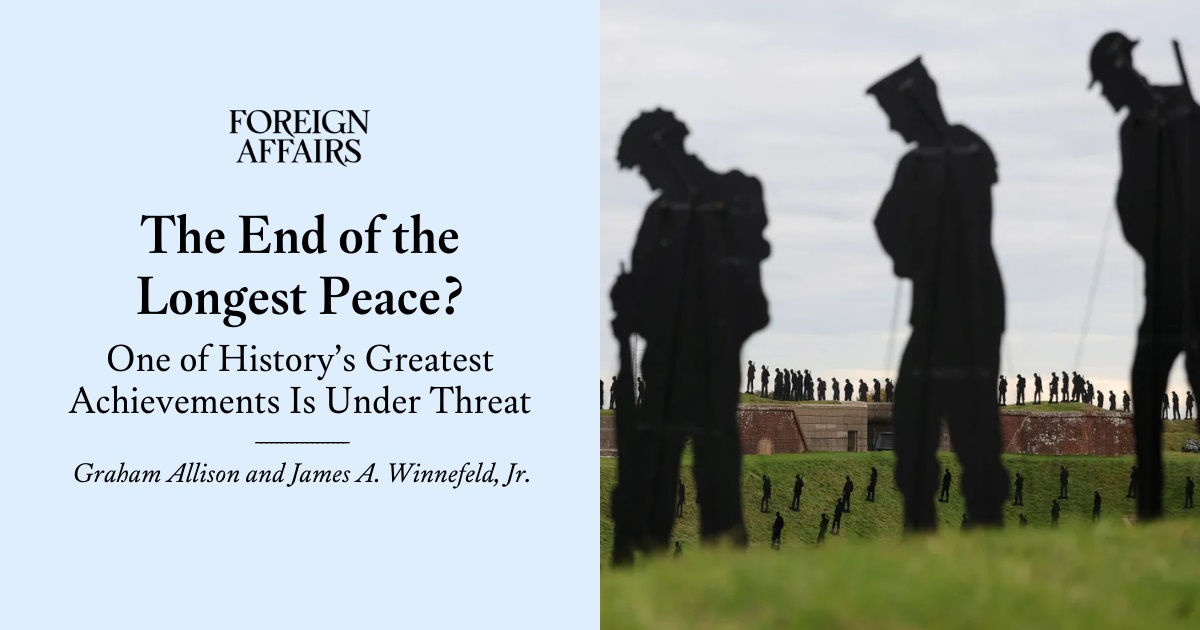
The past eight decades have been the longest period without a war between great powers since the Roman Empire. This anomalous era of extended peace came after two catastrophic wars, each of which was so much more destructive than prior conflicts that historians found it necessary to create an entirely new category to describe them: world wars.
The absence of great-power wars since 1945 did not happen by accident. A large measure of grace and good fortune is part of the story. But the experience of catastrophic war also compelled the architects of the postwar order to attempt to bend the arc of history, ‘Foreign Affairs’ writes.
A Miraculous Achievement
Three numbers capture the defining features — and successes — of the international security order: 80, 80, and nine. It has been 80 years since the last hot war between great powers. This has enabled the global population to triple, life expectancy to double, and global GDP to grow 15-fold. If, instead, post–World War II statesmen had settled for history as usual, a third world war would have occurred. But it would have been fought with nuclear weapons. It could have been the war to end all wars.
It has also been 80 years since nuclear weapons were last used in war. The world has survived several close calls — most dangerously the Cuban missile crisis, when the United States faced off with the Soviet Union over nuclear-tipped missiles in Cuba and during which President John F. Kennedy estimated the odds of nuclear war to be between one in three and one in two.
In the 1950s and 1960s, world leaders expected countries to build nuclear weapons as they acquired the technical capability to do so.
Dangers Ahead
Before his death, in 2023, Henry Kissinger repeatedly reminded colleagues that he believed these eight decades of great-power peace were unlikely to reach a full century. Among the factors that history shows contribute to the violent end of a major geopolitical cycle, five stand out that could bring the ongoing long peace to a close.
At the top of the list is amnesia. Successive generations of American adults, including every serving military officer, have no personal memory of the horrible costs of a great-power war. Few people recognize that, prior to this exceptional era of peace, a war in each generation or two was the norm.
The existence of rising competitors also threatens peace. China’s meteoric ascent is challenging U.S. preeminence, echoing the type of fierce rivalry between an established and a rising power that the ancient Greek historian Thucydides warned would lead to conflict.
Global economic leveling further increases the possibility of war. American economic predominance has eroded as other countries have recovered from the devastation of the two world wars. At the end of World War II, when most other major economies had been destroyed, the United States had one-half of the world’s GDP; when the Cold War ended, the U.S. share had fallen to one-quarter. Today, the United States has only one-seventh. With this shift in the balance of national economic power, a multipolar world is emerging in which multiple independent states can act within their spheres of influence without asking permission or fearing punishment. This erosion accelerates when the dominant power overextends itself financially, as the celebrated hedge fund manager Ray Dalio argues the United States is doing today.
Successive generations of American adults have no personal memory of a great-power war. When an established power also overextends itself militarily — especially in conflicts that rank low on a list of its vital interests — its ability to deter or defend against rising powers weakens.
The ancient Chinese philosopher Sun-tzu wrote, “When the army engages in protracted conflicts the resources of the state will fall short,” which could describe the costly mission creep of U.S. forces in Iraq and Afghanistan and the military’s inability to focus on more pressing challenges. Narrowly concentrating resources on these extended conflicts drew the United States’ attention away from improving its defense capabilities against increasingly sophisticated and more dangerous adversaries. Of even greater concern is the extent to which the U.S. national security establishment has fallen into a vicious cycle, supported by Congress and the defense industry, in which it demands more means — increased funding — rather than looking for more strategic ways to address grave threats to its national interests.
Finally, and most concerning, the tendency of an established power to descend into bitter political divisions at home paralyzes its ability to act coherently on the world stage. This is particularly troublesome when leaders oscillate between opposing positions on whether and how the country should maintain a successful global order. This is unfolding today: an ostensibly well-meaning administration in Washington is upending nearly every existing international relationship, institution, and process to impose its view of how the international order must change.
Long-wave geopolitical cycles do not last forever.
The most important question facing Americans and the divided U.S. polity is whether the nation can gather itself to recognize the perils of the moment, find the wisdom required to navigate it, and take collective action to prevent — or more accurately, postpone — the next global convulsion.
read more in our Telegram-channel https://t.me/The_International_Affairs

 11:32 28.11.2025 •
11:32 28.11.2025 •






















